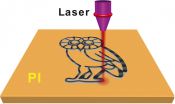(Press-News.org) In patients with metastatic triple-negative breast cancer--a disease with no approved targeted therapies--infusion of pembrolizumab produced durable responses in almost one out of five patients enrolled in a phase-Ib clinical trial, according to data presented Dec. 10, at the 2014 San Antonio Breast Cancer Symposium.
The multi-center, non-randomized trial was designed to evaluate the safety, tolerability and antitumor activity of bi-weekly infusions of pembrolizumab (MK-3475, marketed as Keytruda®). The researchers enrolled 27 patients, aged 29 to 72 years, who had metastatic triple-negative breast cancer that either relapsed after treatment for early stage disease or progressed on therapy for advanced disease.
"For this group of patients our treatment options are limited to chemotherapy," said study director Rita Nanda, MD, assistant professor of medicine and associate director of the breast medical oncology program at the University of Chicago.
All patients in the study had triple-negative tumors with high levels of a protein called programmed death-ligand 1 (PD-L1). This protein can suppress the immune system's efforts to eliminate cancer cells. Pembrolizumab is a monoclonal antibody designed to help reactivate a person's own immune system to help fight the tumor.
"Pembrolizumab appears to make a significant difference for a subset of patients," Nanda said. "Of the 27 patients in this study with measurable disease, five (18.5%) had encouraging results. One patient had a complete response, and four had a partial response to treatment."
Responses for those five patients were long-lasting. Meanwhile, the patient with a complete response and two of those with a partial response continue to be treated with pembrolizumab.
An additional seven patients had stable disease, and twelve had progressive disease. Three patients left the trial early because their disease progressed.
Pembrolizumab, approved in September 2014 by the Food and Drug Administration for treatment of melanoma, does have some side effects. But Nanda said those are generally mild and easy to manage. They include fatigue, cough, nausea, itchy skin, rash, decreased appetite, constipation, joint pain and diarrhea.
In this trial, four of the 27 patients experienced at least one severe or life-threatening drug-related adverse event. One patient died while on the study treatment.
"The median survival for patients with triple-negative breast cancer is approximately one year," Nanda said. "We need better treatments for this disease. The promising activity of pembrolizumab seen in PD-L1-expressing, triple-negative breast cancer is exciting, and certainly worthy of further investigation."
An important next step, she said, is to learn how to predict which patients are most likely to benefit and how to manage the drug's toxicity.
An earlier study of pembrolizumab, presented in June at the annual meeting of the American Society of Clinical Oncology by Tanguy Seiwert, MD, assistant professor of medicine at the University of Chicago, found a similar response rate in PD-L1 positive patients with advanced head and neck cancer.
Antitumor Activity by Response Evaluation Criteria in Solid Tumors (RECIST) v1.1, Central Review*, Patients Evaluable for Response (n=27)a
Overall Response Rate (ORR), n (%) 5 (18.5)
Best Overall Response, n (%)
Complete Responseb 1 (3.7)
Partial Responseb 4 (14.8)
Stable Disease 7 (25.9)
Progressive Disease 12 (44.4)
No Assessmentc 3 (11.1)
*Analysis cut-off as of: November 10, 2014.
aIncludes patients with measurable disease at baseline who received ≥1 pembrolizumab dose and who had ≥1 post-baseline scan or discontinued therapy before the first scan due to progressive disease or a treatment-related AE. Five patients were excluded because they did not have any assessments per central review (n=2) or because they did not have measurable disease per central review at baseline (n=3).
bConfirmed responses only.
c"No assessment" signifies patients who discontinued therapy before the first post-baseline scan due to progressive disease or a treatment-related AE.
INFORMATION:
The study was funded by Merck, known as MSD outside the U.S. and Canada. Nanda declares no conflicts of interest. Additional authors were Laura Chow, E. Claire Dees, Raanan Berger, Shilpa Gupta, Ravit Geva, Lajos Pusztai, Marisa Dolled-Filhart, Kenneth Emancipator, Edward J. Gonzalez, Jennifer Houp, Kumudu Pathiraja, Vassiliki Karantza, Robert Iannone, Christine Gause, Jonathan Cheng and Laurence Buisseret.
Several past studies have suggested that the magnetic fields created by phones, high-voltage power lines and other electrical equipment are harmful for humans.
Research first carried out in the 1970's and again subsequently, found an association between people living near overhead power lines and an increased risk of childhood leukaemia. Although some later studies have failed to find such a link, the International Agency for Research on Cancer has categorised low frequency magnetic fields as "possibly carcinogenic."
But a mechanism for this association has never been ...
While many different combinations of genetic traits can cause autism, brains affected by autism share a pattern of ramped-up immune responses, an analysis of data from autopsied human brains reveals. The study, a collaborative effort between Johns Hopkins and the University of Alabama at Birmingham, included data from 72 autism and control brains. It will be published online Dec. 10 in the journal Nature Communications.
"There are many different ways of getting autism, but we found that they all have the same downstream effect," says Dan Arking, Ph.D. , an associate professor ...
HOUSTON - (Dec. 10, 2014) - Researchers at Rice University have created flexible, patterned sheets of multilayer graphene from a cheap polymer by burning it with a computer-controlled laser. The process works in air at room temperature and eliminates the need for hot furnaces and controlled environments, and it makes graphene that may be suitable for electronics or energy storage.
Under a microscope, what the researchers call laser-induced graphene (LIG) doesn't look like a perfect chicken wire-like grid of atoms. Instead, it's a jumble of interconnected graphene flakes ...
Phoenix, AZ (December 10th, 2014) - The brain responds differently to two kinds of sugar, according to a report today at the American College of Neuropsychopharmacology annual meeting in Phoenix Arizona. The study suggests that fructose heightens the response of brain reward circuits to food cues, promoting feeding behavior.
Currently, roughly two out of three U.S. adults are overweight and one out of three is obese. Changes in lifestyle and dietary intake during the past quarter century are thought to be the main culprits, with the increase in fructose consumption of ...
PISCATAWAY, NJ - Communities with fewer places to buy or drink alcohol also tend to have lower rates of intimate partner violence, new evidence suggests.
The research, published in the January issue of the Journal of Studies on Alcohol and Drugs, suggests that laws limiting what is called "alcohol outlet density" could offer one way to address violence within intimate relationships.
States and communities throughout the United States have enacted various laws to reduce excessive use of alcohol, including limiting outlet density, limiting hours and days of sale, and ...
The simple act of saving something, such as a file on a computer, may improve our memory for the information we encounter next, according to new research published in Psychological Science, a journal of the Association for Psychological Science. The research suggests that the act of saving helps to free up cognitive resources that can be used to remember new information.
Our findings show that people are significantly better at learning and remembering new information when they save previous information," says psychological scientist and study author Benjamin Storm of ...
PITTSBURGH, Dec. 9, 2014 - A treatment pioneered at the University of Pittsburgh Center for Vaccine Research (CVR) is far more effective than traditional antibiotics at inhibiting the growth of drug-resistant bacteria, including so-called "superbugs" resistant to almost all existing antibiotics, which plague hospitals and nursing homes.
The findings, announced online in the journal Antimicrobial Agents and Chemotherapy and funded by the National Institutes of Health, provide a needed boost to the field of antibiotic development, which has been limited in the last four ...
Berkeley -- A systematic overview of more than 100 studies comparing organic and conventional farming finds that the crop yields of organic agriculture are higher than previously thought. The study, conducted by researchers at the University of California, Berkeley, also found that certain practices could further shrink the productivity gap between organic crops and conventional farming.
The study, to be published online Wednesday, Dec. 10, in the Proceedings of the Royal Society B, tackles the lingering perception that organic farming, while offering an environmentally ...
In an editorial published online today in the International Journal of Epidemiology, experts from the Departments of Psychiatry and Epidemiology at Columbia University, New York, are calling for survivors of the Ebola epidemic to be mobilised in a bid to hasten containment of the disease.
We already know that the current Ebola outbreak is unique in its magnitude and for its dispersion in dense, mobile populations. Physicians and nurses face high mortality, and foreign aid in the form of medical supplies and staff continues to be unequal to the scope of the problem. With ...
In a world first study researchers have found a coral-eating fish that disguises its smell to hide from predators.
"For many animals vision is less important than their sense of smell," says study lead author Dr Rohan Brooker from the ARC Centre of Excellence for Coral Reef Studies (Coral CoE) at James Cook University.
"Because predators often rely on odors to find their prey, even visually camouflaged animals may stick out like a sore thumb if they smell strongly of 'food'." Dr Brooker says.
The research, published in the journal Proceedings of the Royal Society B, ...




